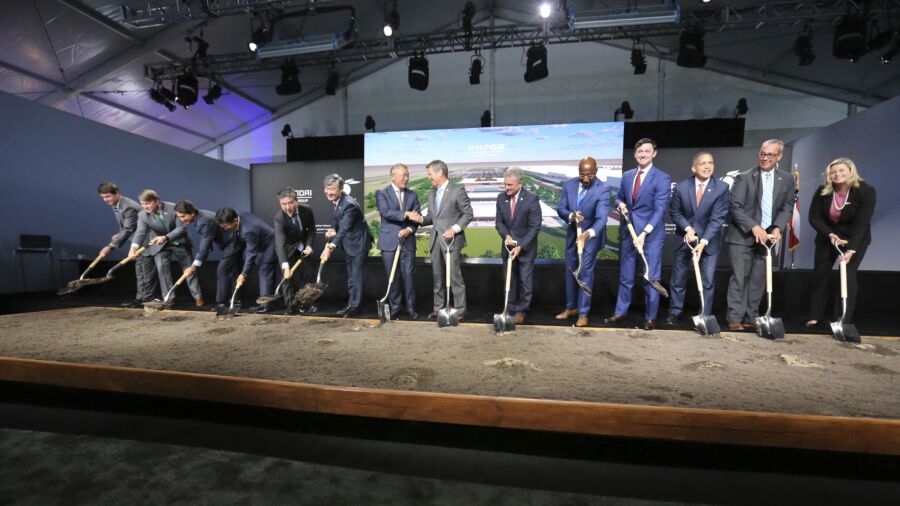ATLANTA—Hyundai Motor Group and LG Energy Solution announced Thursday they will build a $4.3 billion electric battery plant as part of Hyundai’s new electric vehicle assembly plant in southeast Georgia.
The companies will split the investment, starting production as soon as late 2025.
Hyundai Motor Co. CEO Jaehoon Chang said in a statement that the battery plant would “create a strong foundation to lead the global EV transition,” explaining the company wants to speed up efforts to produce electrified Hyundai and Kia vehicles in North America.
“Hyundai Motor Group is focusing on its electrification efforts to secure a leadership position in the global auto industry,” Chang said.
The South Korean automaker said in 2022 it would invest $5.5 billion to assemble electric vehicles and batteries in Ellabell, just west of Savannah. The site is supposed to have 8,100 employees and is slated to begin producing vehicles in 2025.
Garrison Douglas, a spokesperson for Republican Gov. Brian Kemp, said the 3,000-job battery plant would be part of the 8,100 overall jobs and the $4.3 billion investment would be part of the previously announced $5.5 billion total.
The Hyundai/LG plant is supposed to be able to supply batteries for 300,000 electric vehicles per year, which is the initial projected production of the adjoining vehicle assembly plant. Hyundai has said the Georgia plant could later expand to build 500,000 vehicles annually.
“This is exactly what we envisioned when Georgia landed the Hyundai Metaplant in May of last year, and this project is the latest milestone in Georgia’s path to becoming the EV capital of the nation,” Kemp said in a statement.
In addition to the assembly and battery plants, auto parts suppliers have pledged to invest more than $2 billion and hire 4,800 people in the region around the Hyundai site.
The announcements are part of an electric vehicle and battery land rush across the United States. Under the U.S. Inflation Reduction Act, EVs must be assembled in North America, and a certain percentage of their battery parts and minerals must come from North America or a U.S. free trade partner to qualify for a full $7,500 EV tax credit.
Currently, no Hyundai or Kia vehicles are eligible for the tax credit unless they are leased. Hyundai opposed having foreign-made vehicles excluded, in part because it’s building American factories. Kemp has supported that position, but Democratic Sen. Jon Ossoff says Hyundai should wait until it is producing vehicles domestically, using American-made batteries.
“As soon as those vehicles are produced in Georgia, they can be eligible for the credits through the incentives in the IRA,” Ossoff told reporters in an online news conference Friday morning. “These manufacturing incentives are attracting and accelerating billions of dollars of investments in jobs and advanced energy and electric vehicle production capacity here in the state of Georgia.”
LG said this would be its seventh battery plant in operation or under construction in the U.S., saying it was concentrating efforts to expand production in the country, in one example of how federal incentives are luring manufacturers.
This is the second huge electric battery plant that Hyundai is partnering to build in Georgia. Hyundai and SK On, a unit of South Korea’s SK Group, announced in December they would jointly invest $4 billion to $5 billion to build a new plant northwest of Atlanta that would supply electric batteries for Hyundai and Kia electric vehicles assembled in the U.S. That plant, in Cartersville, is planned to begin production in 2025 and employ a projected 3,500 people.
Hyundai will need batteries for more than just vehicles made in Ellabell. The company is already assembling electric vehicles at its plant in Montgomery, Alabama, and announced in April it would start assembling its electric Kia EV9 large SUV at the Kia plant in West Point, Georgia.
Partnering with LG and SK also will diversify Hyundai’s supplier base, giving the automaker more than one battery manufacturer from which to buy.
Because the battery plant is part of the overall Hyundai complex, Douglas said no additional incentives would be offered.
The state of Georgia and local governments already have pledged $1.8 billion in tax breaks and other incentives. It’s the largest subsidy package a U.S. state has ever promised an automotive plant, according to Greg LeRoy, executive director Good Jobs First, a group skeptical of subsidies to private companies.
By Jeff Amy

